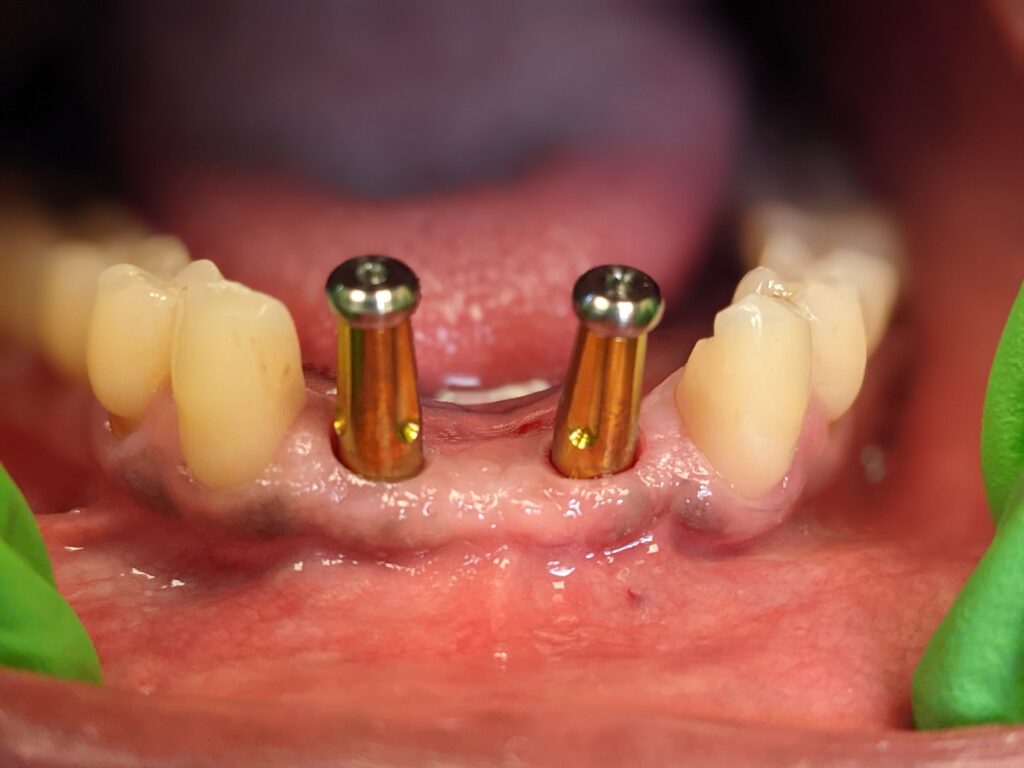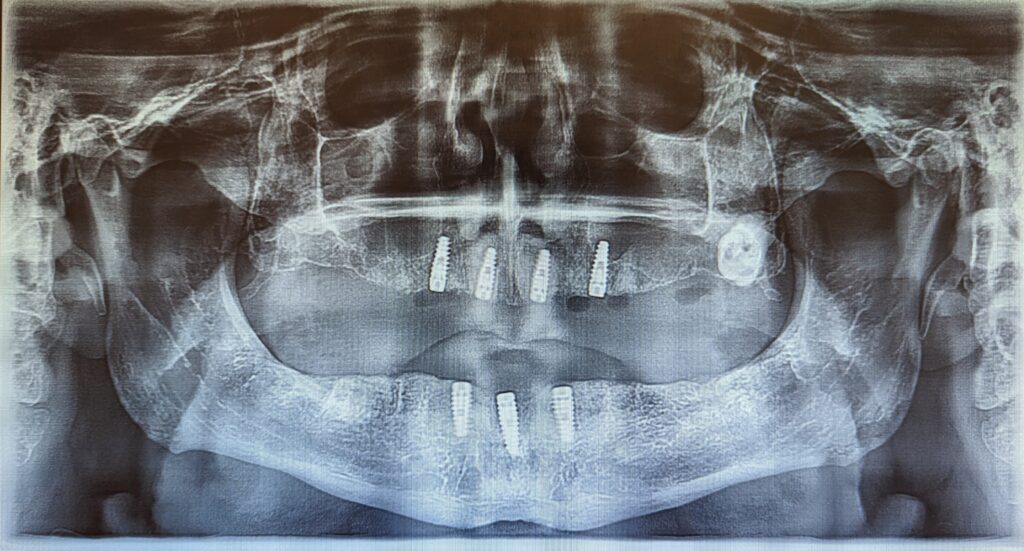DENTAL IMPLANT
WHAT ARE DENTAL IMPLANTS?
Dental implants are advanced dental prosthetics designed to replace missing teeth with a long-lasting and natural-looking solution. They consist of three main components: the implant itself, the abutment, and the dental crown.

Implant
The implant is a small, titanium post surgically inserted into the jawbone. Titanium is used because it is biocompatible, meaning it fuses with the bone through a process called osseointegration. This provides a sturdy foundation for the replacement tooth.Abutment
The abutment is a connector piece that attaches to the implant. It extends above the gum line and serves as a support structure for the dental crown. The abutment is usually placed after the implant has fully integrated with the jawbone.Dental Crown
The dental crown is the visible part of the implant and is custom-made to match the color, shape, and size of your natural teeth. It is securely attached to the abutment, completing the implant and restoring the appearance and function of the missing tooth.
Key Features of Dental Implants
- Durability: Dental implants are known for their durability and longevity. With proper care, they can last a lifetime.
- Natural Appearance: Implants look and feel like natural teeth, providing a seamless and aesthetically pleasing solution.
- Preservation of Jawbone: Unlike traditional dentures or bridges, dental implants help preserve the jawbone by stimulating natural bone growth through osseointegration.
- Improved Functionality: Implants restore the full functionality of your teeth, allowing you to bite, chew, and speak confidently.
The Implant Process
- Consultation: Your dentist will assess your oral health
and determine if you are a suitable candidate for
dental implants. - Placement: The implant is surgically placed into the jawbone during a minor procedure. Healing and osseointegration follow over several months.
- Abutment Placement: Once integration is complete, an abutment is attached to the implant during a second minor procedure.
- Crown Placement: Finally, the custom-designed dental crown is placed on the abutment, completing the implant.

Dental implants offer a range of benefits
that make them a popular and effective
solution for replacing missing teeth.
Here are some key advantages
Natural Look and Feel:
Dental implants closely mimic the appearance and feel of natural teeth. The custom-designed crowns are color-matched to your existing teeth, creating a seamless and natural smile.- Long-Term Durability:
Dental implants are known for their durability and longevity. With proper care, they have the potential to last a lifetime, making them a cost-effective solution in the long run. - Improved Speech and Eating Function:
Unlike removable dentures that may slip or cause discomfort, dental implants provide stable support for chewing and speaking. They allow for a more natural and confident eating and speaking experience. - Preservation of Jawbone and Facial Structure:
Implants stimulate natural bone growth through osseointegration, preserving the jawbone and preventing the deterioration that can occur with missing teeth. This helps maintain facial structure and prevent a sunken appearance. - No Impact on Adjacent Teeth:
Unlike traditional dental bridges, implants do not require the alteration of adjacent healthy teeth for support. This preserves the integrity of surrounding teeth, promoting overall oral health.
- Enhanced Comfort and Convenience:
Dental implants become a permanent part of your mouth, eliminating the need for removal or special cleaning procedures. They provide a comfortable and hassle-free solution for everyday life. - Boosted Confidence and Self-Esteem:
Dental implants can significantly boost confidence and self-esteem by restoring a complete and natural-looking smile. Patients often feel more comfortable in social and professional settings. - Easy Maintenance:
Dental implants require the same care as natural teeth – regular brushing, flossing, and routine dental check-ups. There are no special adhesives or cleaning solutions necessary. - Prevention of Shifting Teeth:
Gaps left by missing teeth can lead to adjacent teeth shifting out of position. Dental implants fill these gaps, preventing the misalignment of neighboring teeth. - High Success Rate:
Dental implants have a high success rate when placed by experienced professionals. Proper oral hygiene practices and regular dental check-ups contribute to their long-term success.
To ensure a successful implant for your teeth, it is essential to have a strong and healthy jawbone. The jawbone needs to fuse with the posts to provide long-term support. At Elite Dental, we come across patients who are interested in dental implants but need more jawbone density. However, such patients can still be considered for the procedure with preliminary treatments like bone grafting and sinus lifts. If you’re considering dental implant surgery, contact us today to learn more about the advanced procedures required beforehand.
Dental Implant FAQs
How Can Dental Implants Fail?
Dental implant failure is uncommon, but when it does occur, it can typically be linked back to either peri-implantitis or failed osseointegration. Peri-implantitis is actually a specific type of gum disease that can form around dental implant posts and slowly destroy the tissues holding the implant in place; it’s usually a consequence of poor oral hygiene or the use of tobacco. Failed osseointegration means that the implant has not fused with the jawbone like it’s supposed to, which could be the result of a certain health condition or an injury. Fortunately, there are plenty of ways to keep the risk of implant failure to a minimum; we can give you some guidelines to follow for ensuring the success of your new teeth.
It's also important to select a professional who’s undergone advanced training in dental implants and is part of a prestigious organization for implant dentistry. Fortunately, Dr. is a member of the American Academy of Implant Dentistry while Dr. is a proud member of the International Team for Implantology Study Club!
How Much Does it Cost to Get a Tooth Extracted Without Insurance?
On average, the fee for tooth extractions in markets throughout the United States is typically between $150 and $400. Of course, this will depend on a variety of factors, such as geography and the condition of a patient’s dental health. Your dentist will also need to consider the difficulty of your specific procedure and if you require further services, such as sedation dentistry, which can affect the overall cost. If you have an insurance plan, be sure to make the most out of it by consulting your provider about the details of your policy. Your company and your dentist can negotiate the fees of the procedure so that your out-of-pocket expenses are reduced.
How Do I Get Emergency Dental Care?
The first thing you need to do is to call our practice so that someone on our team can help you. We’ll be able to quickly review your situation and pencil you in so that you can get the treatment you need right away. However, if your situation is more serious, such as difficulty breathing/swallowing or your jaw is dislocated or broken, then calling 911 and/or a trip to the nearest ER will be necessary. Most hospitals may not be fully equipped to handle dental emergencies or won’t have a dentist on staff, but they can at least alleviate your pain and provide antibiotics to keep you safe. Once you’ve been treated, you can schedule a visit with our team.
We offer same-day appointments as well as sedation dentistry to make sure you’re comfortable while getting the treatment you need. Remember, most emergencies begin with underlying issues that are preventable, so make sure to visit your dentist regularly to lower your chances of experiencing one.
How Much Does a Dental Checkup & Cleaning Cost in Dr.?
The price can often vary between $200 and $350 on average in the United States. This can depend on geography and a person’s oral health. These visits usually involve a regular review of your medical/dental history, a discussion of your concerns, and then an examination that includes x-rays, an oral cancer screening, and a professional cleaning. If you have dental insurance, your dentist and provider can negotiate the prices so that you won’t have to break the bank while taking care of your teeth.
